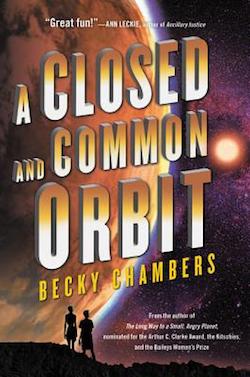Getting it right the second time
Last summer, I wrote about The Long Way to a Small, Angry Planet, a sci-fi novel from Portland author Becky Chambers. I gave the book a hard time, chastising it for treading a little too closely to preexisting science fiction tropes. The piece ended, “I breezed through Long Way, but I don’t know if I’m going to be back for the just-released sequel unless I’m assured that Chambers finally takes her crew somewhere new for a change.”

Not long after my post was published, a Seattle Review of Books reader approached us on Twitter — the tweet is lost to the mists of time, sorry — and said that I really ought to consider reading the second book in Chambers’s series, A Closed and Common Orbit. The reader assured me that the second book was entirely different from the first and did not suffer from a lack of originality.
It took me a while, but I finally listened to the audio version of Orbit, and I am so glad that I did. It’s more than just the continuation of a fun series — it’s a rare case of a sequel surpassing the original installment in every single way.
While Planet was a spacefaring adventure story, Orbit is more of a quiet character piece. The book follows two distinct timelines: in the past, a young factory worker is freed from slave conditions and raised to adulthood by an artificial intelligence. In the present, that same factory worker herself becomes an adopted mother figure to an artificial intelligence that recently took up residence in a biological body for the first time.
Orbit is interested in a lot of big issues. It examines what it means to be a self-possessed woman when cultures punish women for demonstrating their autonomy. It focuses on the moment when a child becomes a parent. It wonders at the ways in which women can help each other overcome generational trauma.
With Orbit, Chambers has proven that she is a sci-fi talent who demands to be closely watched. She’s fearless in the way she entirely switches genres between the first and second volume of her series — from space opera to family drama — without betraying the characters or themes of the books.
It’s impossible for me to say for sure, but I think a reader could just start Chambers’s series with Orbit; all the information you need to know is dropped in the first few pages of the second book. But I’d recommend going back and reading Planet in any case: it’s a quick read, and the dramatic evolution from the first book to the second is quite striking. Without the long and bumpy journey of the first book, the deep emotional stakes of the second book might not resonate in quite the same way.
I’m so pleased to have been wrong about Chambers’s goals for the series, and I’m so thrilled that a SRoB reader nudged me in the direction of this remarkable novel about women and mothers and daughters. I can’t wait to see where Chambers goes next.